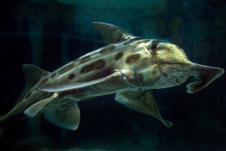 Wednesday 26 April 2017 9:27am
Wednesday 26 April 2017 9:27am
Photo courtesy: SEA LIFE Kelly Tarlton's Auckland
Before you pop that piece of battered fish in your mouth, be aware it might just hold the key to understanding the origins of a form of DNA memory critical to human development.
The unusual looking elephant shark (Callorhinchus milii), commonly used in fish and chip shops throughout New Zealand, is only a very distant relative of humans.
But University of Otago geneticists have discovered it has a remarkably similar DNA memory system to our own.
"This memory is made up of tiny chemical tags called methylation, which are used to tell a cell what its job is and make sure it stays dedicated to it," research leader Dr Tim Hore, of the Department of Anatomy, says.
The DNA memory system that belongs to humans has only been found in vertebrates – animals with a backbone such as mammals, amphibians and fish – and researchers have long wondered how it evolved and how far back in evolutionary time it exists.
First author of the study, Dr Julian Peat of the Anatomy Department, says the fact elephant sharks also use methylation-tagging to turn off genes tells us this memory system has been around a long time.
Our ancestors split off from elephant sharks more than 460 million years ago.
“Our study identifies elephant shark as the most evolutionarily distant animal that shares this DNA-regulation system with us humans, which makes it very interesting to take a closer look at,” Dr Peat says.
Dr Hore says, with access to this unique genetic resource, the team is excited about further research on the elephant shark and its DNA.
“The elephant shark is something of a living fossil – it's the slowest evolving vertebrate we know of. It only lives in the cooler waters of Australia and New Zealand, so we are really fortunate to have something this valuable to science in our backyard.
“So many things remain mysterious about the elephant shark – we don't know whether this methylation memory persists across generations, or if it contributes to how gender is decided."
The study has been posted online in the open-access/freely-accessible journal F1000 Research and will now undergo public peer review by international scientists.
Funding for this work was provided by a University of Otago Research Grant and research was completed within the Department of Anatomy.
For more information, please contact:
Dr Tim Hore
Department of Anatomy, University of Otago
Tel 3 479 7372
Mob 020 4072 9916
Email tim.hore@otago.ac.nz
A list of Otago experts available for media comment is available elsewhere on this website.
Electronic addresses (including email accounts, instant messaging services, or telephone accounts) published on this page are for the sole purpose of contact with the individuals concerned, in their capacity as officers, employees or students of the University of Otago, or their respective organisation. Publication of any such electronic address is not to be taken as consent to receive unsolicited commercial electronic messages by the address holder.